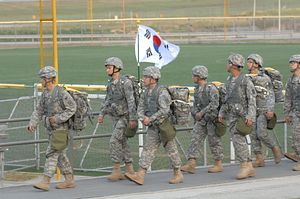South Korea’s army chief of staff, Kim Yo-hwan, is in Beijing this week for visits with Chinese military leaders. On Tuesday, he met with Chinese Defense Minister Chang Wanquan. According to a brief report from Xinhua, Chang “lauded the rapid growth of China-ROK ties,” including the “sound military-to-military relations” between the two countries. Kim, meanwhile, advocated for more military exchanges and defense cooperation between Beijing and Seoul.
There’s been much discussion of the growth of Sino-Korean ties under Chinese President Xi Jinping and South Korean President Park Geun-hye (who both came to power in early 2013). However, the general wisdom holds that South Korea and China are growing closer mostly on the economic front, while Seoul depends on its ally, the United States, for backing on security issues. This dynamic has placed South Korea in an awkward position when it comes to security issues — most notably the deployment of the missile defense system THAAD on the Korean peninsula, something Washington is eager to see and Beijing is just as eager to avoid.
In part, the security gap between China and South Korea stems from Beijing’s unease over Seoul’s relationship with Washington. But just as importantly, from South Korea’s perspective, China’s support for North Korea (which remains the major security threat to Seoul) is a stumbling block to deeper cooperation on defense issues. China’s refusal to support South Korea (or condemn Pyongyang) in the wake of the 2010 sinking of the Cheonan, and the subsequent North Korean shelling of Yeonpyeong island, still rankles in Seoul.
Given the complications of their external alliances, bilateral military cooperation between China and South Korea is difficult. The two sides have often agreed to raise or deepen their defense cooperation, but progress has been slow. According to Xinhua, the two sides do have regular military exchanges: “[M]ore than 30 groups of military delegates visit each other every year for regular meetings and exchange programs.” China and South Korea also enjoy regular high-level visits, a trend that has accelerated recently. This year alone, besides Kim’s trip to Beijing, Chang paid his own visit to South Korea and South Korea’s navy chief of staff is expected to travel to China. The two sides also announced a plan for a military hotline linking their respective defense ministers in July 2014. The hope is that the hotline can be active by the end of 2015.
However, while China and South Korea have active military exchanges, military cooperation (joint exercises, visits to military bases, information and intelligence sharing, etc) remains limited to non-existent. Joint military cooperation is mostly limited to the multilateral setting, such as China and South Korea both participating in international peacekeeping operations and anti-piracy patrols in the Gulf of Aden. According to the latest U.S. Department of Defense report on China’s military, since 2008 China and South have held only one joint bilateral military exercise – an unnamed anti-piracy drill held in 2010. By contrast, China has held five bilateral military exercises with Thailand, another U.S. ally.
China and South Korea nominally enjoy a “strategic cooperative partnership,” but when it actually comes to strategic and defense issues, their ties lag far behind their economic relationship. In China, a common phrase used to describe the current China-South Korea relationship is saying the countries enjoy a “hot economics and warm politics” – meaning close economic ties and burgeoning political ties. The unspoken truth is that the two neighbors have relatively “cold” military relations, and that’s unlikely to change anytime soon.

































